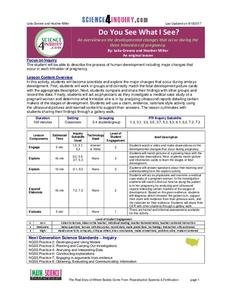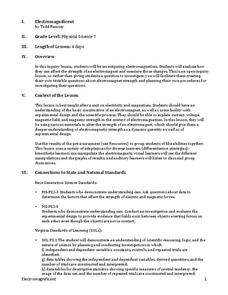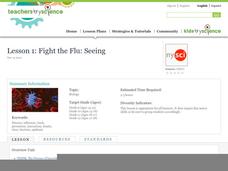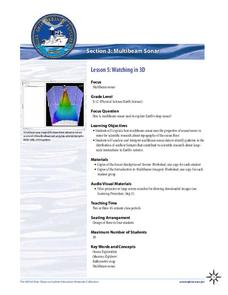Curated OER
Changing Planet: Adaptation of Species (Birds and Butterflies)
A video about the impact of climate change on butterfly populations and a PowerPoint about butterfly and bird adaptations warm science learners up for the activity to follow. Using a variety of tools that reprsent unique styles of bird...
ARKive
Biodiversity and Evolution – Darwin’s Finches
Teens experience natural selection firsthand (or first beak) in an activity that has them act as finches foraging for food. Using different household items to act as different beak styles, your little finches will collect as much food...
Science 4 Inquiry
Do You See What I See?
In only nine months, a small group of cells grows into a fully developed baby. Pupils learn about the development of an embryo to a fetus to a baby. They identify each step of weekly development. Young scientists look at ultrasounds to...
Personal Genetics Education Project
Direct-to-consumer Genetic Testing
If you knew that you were likely to develop Alzheimer's disease in your future, how would it affect your life in the meantime? This and other similar thought-provoking questions are discussed in a lesson plan about the availability of...
NASA
Einstein's Gravity
Assist your high school class with researching and applying the principles of gravity so they may further understand why Einstein is so widely recognized, even today. Individuals compare and contrast two different models that demonstrate...
STEM for Teachers
Electromagnificent
This physics pun really hertz, but this STEM lesson plan can help. The inquiry-based activity has young scientists create a testable question about electromagnetic strength; plan and implement their own experiments; and record and...
Serendip
Photosynthesis and Cellular Respiration
How does energy from the sun make plants grow? Scholars move step by step through the processes that promote plant propagation during a detailed lesson. The resource illustrates ADP production and hydrolysis, then allows learners to...
Curated OER
The Living Environment
Sixth graders show what they know about plant and animal cells. In this cell project lesson, 6th graders get to choose a project based on their learning style. They can create a visual representation of cells, auditory forms, or build a...
NOAA
Importance of Deep-Sea Ecosystems – Chemists with No Backbones
Marine invertebrates offer us many new options for developing pharmaceutical drugs, such as w-conotoxin MVIIA, which is extracted from the cone snail and is a potent painkiller. The lesson encourages scholars to research various types of...
EduGAINs
Go Eco! Ecosystems
How is a movie theater like a desert biome? Compare systems to ecosystems with a set of activities that focuses on accessing multiple intelligences and building upon knowledge. As learners discuss the ways elements of an ecosystem depend...
Curated OER
The Game is Afoot - A Study of Sherlock Holmes
Mystery is an exciting genre for young readers to investigate. The plots are so intriguing! Here is a series of lessons featuring Sherlock Holmes stories that invite learners to enter the world of the mystery genre. Based on what they...
Curated OER
Lesson 1: Fight the Flu: Seeing
The flu has been a deadly epidemic many times in the past. By examining technological innovations throughout history, then simulating the spread of disease from person to person through a classroom investigation, and finishing up with...
University of Hawaiʻi
Taxonomy and Me!
Taxonomy is the study of organisms and how you phylum. Three biology activities are included, helping scholars understand four of the six kingdoms, specifically Protista, Plantae, Fungi, and Animalia. Scholars observe and classify in...
NOAA
Watching in 3D
Bring the ocean floor to life! Earth science scholars discover the process of deep sea mapping in the third installment in a series of five lessons about ocean exploration. The teacher's guide includes helpful resources, worksheets, and...
PBS
Reading Adventure Pack: Rivers
A Reading Adventure Pack showcases a fiction and nonfiction book followed by a series of hands-on activities. First, learners widdle sticks to build a tiny raft, conduct sensory experiments, and create a rap or folk song about rivers and...
Curated OER
Earth's Water
If the majority of our planet is covered with water, why do we need to bother conserving it? With a thorough and varied investigation into the location and types of water on the earth, learners will gain an understanding of why this...
Curated OER
Acid Rain
Create a simulation of acid rain in your classroom with lemon juice and bean plants to help kids study the effects of pollution on plants. In addition, learners will listen to a story and write responses based on guiding questions.
Chicago Botanic Garden
Nature Walk and Ecosystem Introduction
A food web has no organism higher than a tertiary consumer because there wouldn't be enough energy left to sustain them. The fourth installment in a seven-part series begins with a nature walk to get pupils thinking about their...
Chicago Botanic Garden
Food for Thought: Climate Change and Trophic Cascades
Learners examines the arctic food web with a short video about polar bears and an article about bears and warming temperatures. They design an arctic food web and discuss the trophic cascade that could come from climate change.
National Wildlife Federation
The Amazing Adventures of Carbon: How Carbon Cycles through the Earth
Here's a stat for your pupils: 18 percent of the human body is carbon! Part 10 in the series of 12 takes pairs on an adventure through the carbon cycle. After a class reading about carbon, pairs read and choose their own adventure...
PBS
Reading Adventure Pack: Rocks
A Reading Adventure Pack focuses on rocks. Scholars participate in three activities after reading a fiction and nonfiction text—The Jade Stone, a Chinese folktale adapted by Caryn Yacowitz, and Rocks in His Head by Carol Otis Hurst....
Royal Society of Chemistry
Elements 3
Many pupils mix up the chemical symbols for calcium, carbon, and copper. These entertaining puzzles help scholars remember the names and symbols. First, they match the name and symbol of 12 elements. Then, through a series of three...
Royal Society of Chemistry
Elements 2
Did you hear about the chemist reading the book about helium? He couldn't put it down. Scholars match 12 chemical elements, including helium, to their symbols. Then they complete three Sudoku-style puzzles using these names and symbols...
Royal Society of Chemistry
States of Matter 2
While scientists have identified seven states of matter, these puzzles cover the most common three. Scholars match the properties, particle motion, and particle picture to each type of matter. Three Sudoku-style puzzles review the data...
Other popular searches
- Learning Styles Inventory
- Identifying Learning Styles
- Learning Styles Lesson Plans
- Learning Style Inventory
- Determine Learning Styles
- Identify Learning Styles
- Learning Styles Quiz
- Learning Styles Activity
- Test for Learning Styles
- Learning Styles Children
- Learning Style Quiz
- Learning Styles Math Lessons

























